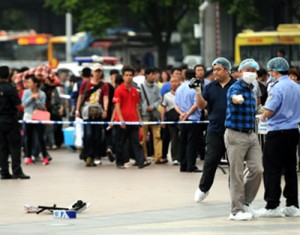A new attack on China increases fear of Islamist terrorism
Thursday, May 8th, 2014 6:44:07 by Jamshed Sindhu
The ethnic and nationalist conflict in the Chinese autonomous region of Xinjiang, home to the Muslim Uighur ethnic minority, has entered a new phase in recent months. Armed attacks regularly punish this area of western China are increasingly well organized, are also produced outside Xinjiang and seek to cause casualties among the civilian population, where until recently were mainly directed against members of the security forces and police police in the autonomous region.
Six people were injured Tuesday in a knife attack carried out by a single assailant in a train station in Guangzhou (capital of Guangdong province), as reported by the police. The author, who has not been identified, was arrested after being wounded by gunfire from agents. Initial reports had spoken of four assailants, and one of them was shot dead by security forces.
Authorities have not explained the reason for the attack, and could be one of indiscriminate attacks with knife occasionally produced in China by citizens with resentment against society, revenge or mental illness. But in recent months, it has grown into China ‘s nervousness about the spread of Islamist violence outside Xinjiang, and is the third knife assault on civilians at a railway station since early March. The previous two were killed, officials said, by ” religious extremists ” Xinjiang connections with groups abroad.
The string of violence has led to increased security measures not only in the autonomous region, where for years they are very strict, but also in railway stations and other transport hubs in the country.
Many Chinese see with uncertainty and fear the spread of violence outside Xinjiang, thousands of miles away, which has made them face a reality that felt alienated. ” We have every day security checks, and the result is that such incidents continues to occur,” says regarding the attack in Guangzhou a user of short message service on the Internet Weibo, similar to Twitter, which quickly circulated some photos and information about what happened without contrast.
The official Chinese agency Xinhua said the attacker was hospitalized but could not be identified because he was not carrying any documents. The incident occurred around 11.30 am (six hours less in mainland Spain). Officers arrived at the station in the outbreak of violence, and shot the author, who had a knife, after he failed to respond to warnings, as he assured the police.
“The Chinese government will undertake strong action to safeguard life and property of the Chinese people,” said the spokesman of Foreign Hua Chunying, which has declined to speculate plenty of responsibility for the attack and said that whoever is guilty ” will be brought to justice, “reports Agence France Presse.
On Wednesday, three people were killed and 79 wounded in an assault with knives and bombs in a train station in Urumqi (capital of Xinjiang). The deceased was a passerby and the two authors. On March 1, 29 people were in the station Kunming (capital of the southern province of Yunnan) died and 143 were injured in the stabbing asestadas during an attack carried out by “a group of separatists in Xinjiang “, according to the Government called. Four of the attackers, including a woman, were shot dead by the police.
The details of what happened on Tuesday in Guangzhou has been contradictory throughout the day. According to the Southern Metropolis Daily in Guangzhou, citing witnesses, several youths took machetes to ” about half a meter long ” after reaching a train and undertook a knife with passengers. She says she wore hats and white dress, which seemed to identify them as Muslims. One version differs from the police.
State television said that the information which indicated that the police had located another suspect near the station are not correct, and that a person who had been arrested had nothing to do with the case.
The attack in Urumqi station last week, came as Chinese President Xi Jinping, was ending a visit to Xinjiang in which ordered to follow the strategy of ” strike first ” to fight terrorism. “The battle to combat violence and terrorism will not allow a moment of carelessness, and we must take strong action to remove firmly unbridled momentum of terrorist actions,” Xi said.
Beijing blames the violence on Islamist separatists in Xinjiang, a region rich in natural resources, on the border with Central Asia, which is rooted in a movement for the creation of an independent state called East Turkestan. Uyghurs in exile and advocacy groups say the real cause of the fighting is the repression by the Government of the practice of Islam and Uighur culture and language.
The spread of violence to other areas of China poses a challenge to the authorities. According to experts, the consequence will be an increase of controls and security measures. But, they say, the government should also think about their ethnic policies.
Last October, three members of a family were killed when Xinjiang launched the car that went into a crowd of tourists at Tiananmen Square in Beijing, and burned the vehicle. They killed a Filipino tourist and a Chinese citizen. A blow with a great symbolic as it occurred near the Great Hall of the People Power heart of China.
Short URL: https://www.newspakistan.pk/?p=43724

















